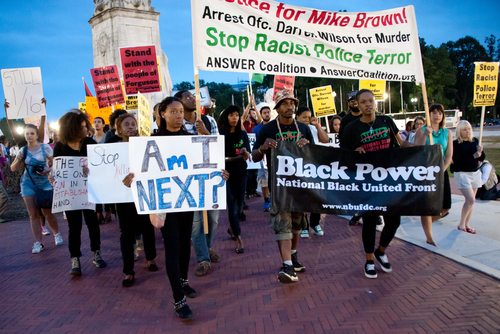
January 2, 2015;Washington Post
In a video posted on People magazine’s website, Oprah Winfrey last Friday criticized the movement of those currently protesting the police shootings of young black men as “leaderless.” In doing so, she illuminated the growing differences between older and younger social justice leaders as regards styles of leadership, coordination, and direction-setting.
In a video on the site, she said:
“I think it’s wonderful to march and to protest and it’s wonderful to see all across the country, people doing it…But what I’m looking for is some kind of leadership to come out of this to say, ‘This is what we want. This is what we want. This is what has to change, and these are the steps that we need to take to make these changes, and this is what we’re willing to do to get it.’”
Protest organizers, many of whom are millennials and women, decried the statement and stated once again that the diffuse, leaderless approach that makes so many older leaders uncomfortable is a purposeful choice based in many considerations. “We very purposefully have been a leaderless movement. […] We’ve been doing that intentionally because we know absolute power corrupts absolutely,” said Brittany Packnett. “That ensures we remain about the heart of the movement rather than certain personalities.”
Sign up for our free newsletters
Subscribe to NPQ's newsletters to have our top stories delivered directly to your inbox.
By signing up, you agree to our privacy policy and terms of use, and to receive messages from NPQ and our partners.
“We’re the lost generation,” said Kayla Reed, 24, who grew up in north St. Louis County. “It was very necessary that we didn’t allow someone who’d done this before to come into this space. Michael Brown was my age bracket.”
In fact, protest organizers say, Winfrey’s statement reveals her as out of touch and elitist.
Some protestors have objected to being represented by the “old guard” of civil rights spokespeople, and although they may not completely conflate the idea of a central decision-making structure with that old guard, Sandhya Somashekhar of the Washington Post writes that Matthew C. Whitaker, director of the Arizona State University Center for the Study of Race and Democracy, believes that times have legitimately changed as far as how a movement may be kept of a piece.
Social media may have in some ways replaced the role of a traditional leader or organization, so the fact that some young people would reject the idea of a central standard-bearer makes some sense, Whitaker said. The protestors prefer “leadership that’s shared and that doesn’t rely so much on one major leader, because history has shown we kill those leaders,” he said. “We marginalize them. We undermine their reputation. We do something to undermine their ability to execute and lead. And, as a result, vacuums are left and the movement crumbles.”
This important conversation has been echoed across many protest movements over the past five years. It deserves careful attention from those interested in movement building in this century.—Ruth McCambridge












